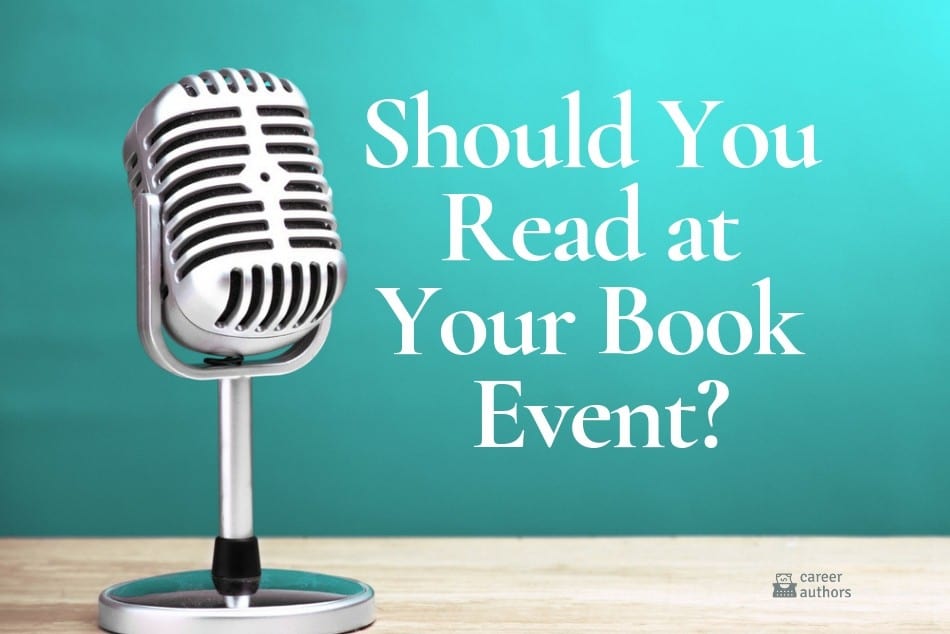Whether to read from your book at an event is a question for the ages. And it can only be answered with the most unsatisfactory answer: It depends.
On the plus side, the answer is: yes, of course! The voice of your book, its compelling story and enchanting drama is what will lead people to buy it. And no matter what you say about how tempting and tantalizing the plot is, there is no way your audience will understand just how glorious your writing is until they actually read it or hear it. It only makes sense.
But if you have ever been to a “reading” where the author who has won you over with their charming presentation decides, in a breathtaking moment of disaster, to read, you’ll know the feeling. You hear the book and think: why would I want to read that?
And yet, on the other hand, we have all heard authors who have hit it out of the ballpark. Who have given fabulous or even marginal presentations, but when they open the book to read an excerpt, we are enchanted and entranced.
The key to decide
So the key to decide whether you should read is this: (This sounds so silly.)
Are you a good reader?
Reading out loud is a skill, a talent, akin to being an actor. Can you read well enough to make your book come to life?
If you have a droning monotone, and will hold the book in front of your face as you read it, word by word, as if someone else wrote it, then no!
If you are a skilled presenter, and can read from your book as if you were an actor doing an audition, then yes, of course. Read.
Briefly.
If you decide that you need to read, or if someone asks you to, that’s great! Your book is your calling card, and reading it is an introduction to the joy that your readers will have when they pick it up themselves. But there are some things you need to think about when you do.
Be proud of your book
Don’t apologize. Don’t make excuses. Be enthusiastic and connect. You’re sharing something wonderful that people want to hear. Read out of joy.
This is the audience’s introduction to the sense of your book. Will they want to read the rest of it? That’s your goal.
Choose a segment that lends itself to reading out loud
Dialogue can be terrific or a disaster. You’ll only know if you try it. Voices can be wonderful if you can pull it off. Or truly annoying. If you can’t do appropriate voices, that’s fine. Simply vary the tone. Listeners are smart. They’ll get it.
When in doubt about a line or paragraph, leave it out.
You may have to do a brief explanation or introduction. Give yourself two or three lines. The audience doesn’t have to understand the whole book.
Remember your goal
Your goal is to make your book come to life. Your goal is to get people to love your writing so much that they can’t live without it.
You get one chance!
(Your goal is not just to get through it!)
Make it special
People love being read to. Make sure the audience can hear and they’re comfortable.
Stand up! If you’re nervous, take a deep breath. Smile. Go on.
Read with expression
Listen to yourself on a tape recorder, or read out loud to someone if you can.
You’ll have to exaggerate and perform a bit. It won’t come out that way. Remember how you tell stories to little kids? That’s easy and natural, right? This is exactly the same thing.
Don’t race through it. A listener’s mind can’t grasp things that quickly. That’s why the readers of audiobooks speak at the speed they do—more slowly. Vary your speed to match what you’re reading.
Be aware of your audience
Don’t worry, but evaluate your listeners as you read. Keep one track of your brain to make sure it’s a shared experience.
Are they listening? Watching? You’ll only know if you make eye contact. What’s working? Should you speed up or slow down?
Practice
There’s no way around this. If you don’t practice, you’ll stumble and you’ll miss inflection and meaning.
If you do stumble, though, don’t worry. Stop. Start over. Pause, begin again. Don’t apologize! It’s just as you would do in a real-life conversation.
Leave them asking for more
Shorter is better. Seriously. No doubt about it. Short. Five minutes at the absolute most. Five minutes is a long time. Stop.
And tell your audience: “This will be short. Three minutes. I just want you to get a tiny taste of the book.” That way they won’t be looking at their watches or worrying they’re held captive.
And end with a cliffhanger, an unanswered question, an unopened door. Or something funny. (If they groan when you stop—you chose the right segment.)
Practice
Because there’s nothing more important. With practice, you can allow yourself to be comfortable, and have bandwidth to handle the surprises that are certain to come.
Have you read at bookstores or libraries? What’s your experience and advice? Let us know at the Career Authors Facebook page.
And then—get writing!





